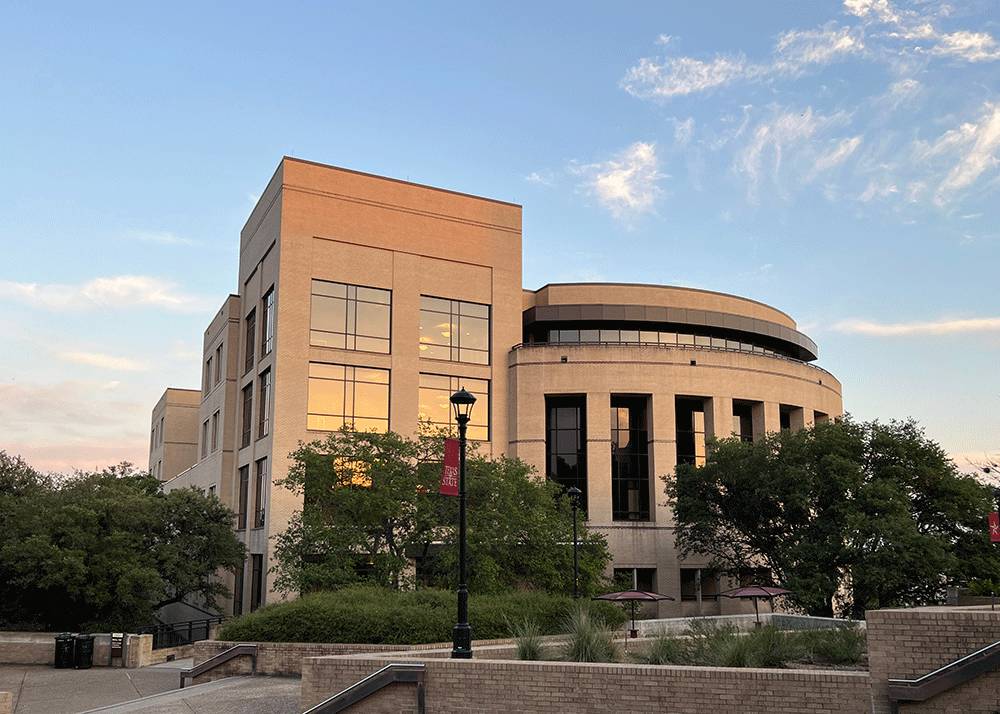The M.B.A. program equips new graduates with the knowledge, skills, and perspectives necessary to lead in the evolving business environment.
Business Administration

Program Overview
The full-time cohort M.B.A. program streamlines graduate studies for those who wish to complete their M.B.A. in a cohort-based format. With some afternoon and mostly evening classes, the 36-hour program spans just 16 months. The full-time cohort M.B.A. program is offered exclusively at the San Marcos campus.
Working professionals seeking a promotion, a career change, or a new venture will find that the flex cohort M.B.A. program offers course scheduling flexibility. Evening classes are offered at the San Marcos campus or online, and students have the option of sitting out a semester if needed.
All McCoy College degree programs are accredited by AACSB International – The Association to Advance Collegiate Schools of Business. The accounting degree programs also hold separate accreditation by AACSB.
Course Work
Full-Time Cohort M.B.A. Program: The Texas State full-time cohort M.B.A. program provides the knowledge and tools needed for a successful career in the management of organizations. The course sequencing requires students to take 10-credit hours in both fall semesters, 13-credit hours in the spring, and the 3-credit hour internship during the summer. Key elements of the program include a high degree of curriculum integration and a strong focus on professional development. For the first semester of the program, separate sections of the Tier I classes are designated for that year's entering cohort. During the summer session, students are required to participate in an internship. In addition, the international trip required in the final semester of the program allows students to work on a field project with a company from the host country.
Flex Cohort M.B.A. Program: Key elements of the program include a high degree of curriculum integration and a strong focus on professional development. Because of the varied backgrounds of faculty, the program is able to offer a general degree as well as degrees across a variety of concentrations.
| Degree | Concentration | Hours | Thesis Option | Minor Option | Location |
|---|---|---|---|---|---|
Degree M.B.A. | Concentration Full-Time Cohort* (No Concentration) | Hours 36 | Thesis Option Non-Thesis | Minor Option No Minor | Location San Marcos |
Degree M.B.A. | Concentration Flex Cohort - General (No Concentration) | Hours 36 | Thesis Option Non-Thesis | Minor Option No Minor | Location San Marcos |
Degree M.B.A. | Concentration Flex Cohort - General (No Concentration) | Hours 36 | Thesis Option Thesis | Minor Option No Minor | Location San Marcos |
Degree M.B.A. | Concentration Flex Cohort - Engineering Technology | Hours 39 | Thesis Option Non-Thesis | Minor Option No Minor | Location San Marcos |
Degree M.B.A. | Concentration Flex Cohort - Computer Information Systems | Hours 39 | Thesis Option Non-Thesis | Minor Option No Minor | Location San Marcos |
Degree M.B.A. | Concentration Flex Cohort - Health Administration | Hours 39 | Thesis Option Non-Thesis | Minor Option No Minor | Location San Marcos |
Degree M.B.A. | Concentration Flex Cohort - Human Resource Management | Hours 39 | Thesis Option Non-Thesis | Minor Option No Minor | Location San Marcos |
Degree M.B.A. | Concentration Flex Cohort - International Business Studies | Hours 39 | Thesis Option Non-Thesis | Minor Option No Minor | Location San Marcos |
Degree M.B.A. | Concentration Flex Cohort - Supply Chain Management | Hours 39 | Thesis Option Non-Thesis | Minor Option No Minor | Location San Marcos |
*The course sequencing requires students to take 10-credit hours in both fall semesters, 13-credit hours in the spring, and the 3-credit hour internship during the summer.
Accelerated Online Programs
| Degree | Concentration | Hours | Thesis Option | Minor Option | Location |
|---|---|---|---|---|---|
Degree M.B.A. | Concentration Flex Cohort - General (No Concentration) | Hours 36 | Thesis Option Non-Thesis | Minor Option No Minor | Location Online |
Degree M.B.A. | Concentration Flex Cohort - General (No Concentration) | Hours 36 | Thesis Option Thesis | Minor Option No Minor | Location Online |
Degree M.B.A. | Concentration Flex Cohort - Business Analytics | Hours 39 | Thesis Option Non-Thesis | Minor Option No Minor | Location Online |
Degree M.B.A. | Concentration Flex Cohort - Marketing | Hours 39 | Thesis Option Non-Thesis | Minor Option No Minor | Location Online |
Degree M.B.A. | Concentration Flex Cohort - Strategic Human Resources | Hours 39 | Thesis Option Non-Thesis | Minor Option No Minor | Location Online |
For more information on online programs, certifications, and international restrictions, visit our Application Policy Information page.
Program Details
The M.B.A. program touts a diverse student population due to the curriculum design, which equips business and non-business majors with a fundamental skill set without requiring prerequisite or leveling courses.
Program Mission
The McCoy College of Business fosters an engaged learning community that prepares a diverse student population for successful business careers as responsible global citizens. The McCoy College complements these efforts with research that adds to knowledge, provides solutions to business challenges and contributes to pedagogical advances.
The McCoy College of Business strives to continue to lead in experiential business education and business-relevant, socially significant research.
Career Options
In addition to a portfolio of quantitative skills, a McCoy M.B.A. student will acquire practical management and leadership skills. These skills are transferable to any industry including technology, healthcare, manufacturing, financial services, consumer products and nonprofits. McCoy M.B.A. graduates have embarked on career paths at a variety of firms including Apple, Applied Materials, Dell, Frost Bank, H-E-B and IBM.
Program Faculty
The McCoy College faculty aspire to create value through business-relevant and socially significant research. The intellectual contributions produced by faculty members add to knowledge about business practices, provide solutions to business challenges, and contribute toward understanding and improving the relationship between business and society. Students often have the opportunity to work with faculty on research through course work and several graduate research assistantships offered by the college.
Contact us for general questions about your application, funding opportunities, and more. If you have specific questions after reviewing the program details, contact the program's graduate advisor.

Already know that Texas State is right for you?
Application Deadlines
In-Person Programs
-
For Entry Prior to Summer 2026
DEADLINES OPTION U.S. CITIZEN INTERNATIONAL Fall - Priority Flex and Full-Time Cohorts January 15 January 15 Fall - Standard Flex and Full-Time Cohorts June 1 June 1 Spring Flex Cohorts Only October 1 October 1 -
Effective for Summer 2026 Entry and Beyond
DEADLINES OPTION U.S. CITIZEN INTERNATIONAL Fall - Priority Flex and Full-Time Cohorts February 1 February 1 Fall - Standard Flex and Full-Time Cohorts August 1 June 1 Spring - Priority Flex Cohorts Only September 1 September 1 Spring - Standard Flex Cohorts Only November 1 October 1
For important information regarding deadlines and decision timelines, review the Application Policy Information page.
Accelerated Online Programs
| Term | Part of Term | Deadline | Start Date |
|---|---|---|---|
| Fall | First 8 Weeks | August 15 | August 25 |
| Fall | Second 8 Weeks | September 30 | October 14 |
| Spring | First 8 Weeks | January 6 | January 20 |
| Spring | Second 8 Weeks | February 24 | March 10 |
| Summer | First 5 Weeks | TBD | TBD |
Admission Requirements
The items required for admission consideration are listed below. Additional information for applicants with international credentials can be found on our international webpages.
-
Application
- completed online application
Review important information about the online application.
-
Application Fee
- $55 nonrefundable application fee, OR
- $90 nonrefundable application fee for applications with international credentials
Review important information about application fees.
-
Transcripts & GPA
- Baccalaureate degree from a regionally accredited university. (Non-U.S. degrees must be equivalent to a four-year U.S. Bachelor’s degree. In most cases, three-year degrees are not considered. Visit our International FAQs for more information.)
- A copy of an official transcript from each institution where course credit was granted.
- An overall competitive GPA or a competitive GPA in your last 60 hours of undergraduate course work, plus any completed graduate courses.
Review important information about transcripts. Official transcripts, sent directly from your institution, will be required if admission is granted.
-
Test Scores
GRE/GMAT for In-Person Program Applicants
- Official GRE/GMAT (general test only) test scores are not required for applicants with an overall 3.5 GPA or a 3.5 GPA in your last-60-hours of undergraduate course work. If your GPA falls below the minimum requirement, the official GRE/GMAT (general test only) with competitive scores will be required in order to be considered. Graduate Admissions will notify applicants via email should this occur.
GRE/GMAT for Accelerated Online Program Applicants
- GRE/GMAT not required
Approved English Proficiency Exam Scores
Applicants are required to submit an approved English proficiency exam score that meets the minimum program requirements below unless they have earned a bachelor’s degree or higher from a regionally accredited U.S. institution or the equivalent from a country on our exempt countries list.
- official TOEFL iBT scores required with a 78 overall and minimum individual module scores of
- 19 listening
- 19 reading
- 19 speaking
- 18 writing
- official PTE scores required with a 52 overall
- official IELTS (academic) scores required with a 6.5 overall and minimum individual module scores of 6.0
- official Duolingo scores required with a 110 overall
- official TOEFL Essentials scores required with an 8.5 overall
This program does not offer admission if the scores above are not met.
Review important information about official test scores. -
Documents
In-Person Program Applicants
- responses to specific essay questions (two essays are required):
- Why have you chosen to pursue a graduate business degree at Texas State University? What do you hope to accomplish during your time in the program?
- Tell us about your three most significant accomplishments. Why do you view them as such? What lessons did you learn from them?
- Optional Personal Statement: In cover-letter format, you may address the admissions committee about anything related to your background, application, and/or desire to attend graduate school at Texas State University.
- resume/CV detailing your work experience, extracurricular and community activities, and honors and achievements
- two letters of recommendation from persons best able to assess your ability to succeed in graduate school
Accelerated Online Program Applicants
- responses to specific essay questions (two essays are required):
- Why have you chosen to pursue a graduate business degree at Texas State University? What do you hope to accomplish during your time in the program?
- Tell us about your three most significant accomplishments. Why do you view them as such? What lessons did you learn from them?
- Optional Personal Statement: In cover-letter format, you may address the admissions committee about anything related to your background, application, and/or desire to attend graduate school at Texas State University.
- resume/CV detailing your work experience, extracurricular and community activities, and honors and achievements
- details of two professional references of persons best able to assess the student’s ability to succeed in graduate school
- two years or more of professional business experience
Review important information about documents.
- responses to specific essay questions (two essays are required):
-
Admissions Review Process
Admission to all graduate business degree programs is competitive and designed to identify those who have the ability, interest, and maturity to manage the rigors of the programs as well as potential for future professional growth; therefore, the admissions committee will carefully consider all aspects of your professional and academic background. The admissions committee will also closely review the qualitative elements of your application, such as letters of recommendation, quality of written essays, relevant work experience, extracurricular and community activities, honors and achievements, and other personal characteristics that will enhance diversity in academic programs.